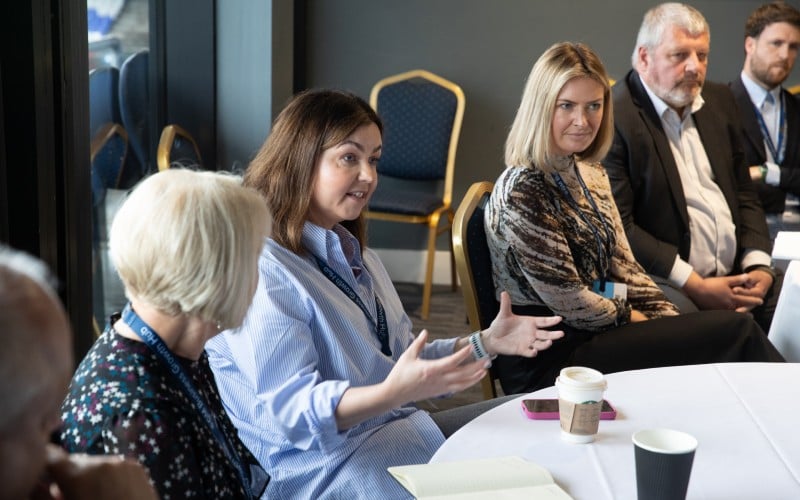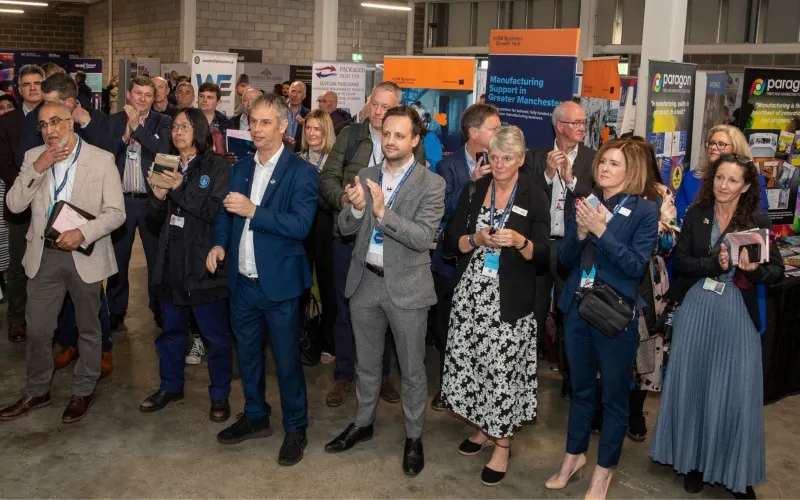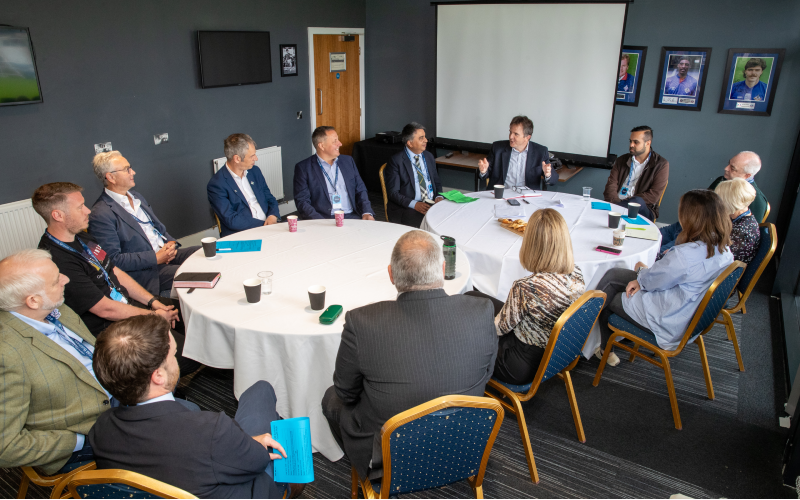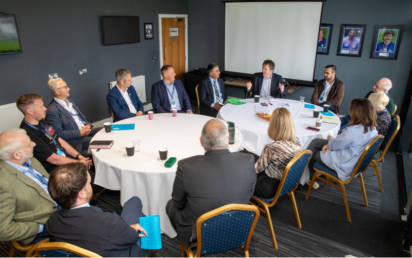Several of Greater Manchester’s leading manufacturers shared their challenges and insights at an exclusive roundtable.
Replacing an aging workforce, investing in technology and automation, developing apprentices and changing the perception of manufacturing were some of the issues raised by an exclusive panel of manufacturers.
The discussion was organised by GM Business Growth Hub as part of their ‘Manufacturing Our Future’ event, which took place at Oldham Athletic’s Boundary Park stadium and was attended by nearly 200 people.
Several of the manufacturers on the panel were included in BusinessCloud’s GM 125 Rising Stars of Business list, in conjunction with GM Business Growth Hub.
Invest in automation
Sarfaraz Akram is the chief operating officer of Rochdale-based yogurt manufacturer Lancashire Farm Dairies, which has doubled turnover to £80m after investing heavily in technology.
“We’re a really aspirational brand,” he said. “We want to continue to invest, we want to continue to grow and sell more yogurt.
“We’ve invested heavily in automation. We need to retain commercial competitiveness as price is really important to the end consumer.
“One way we’ve been able to keep our cost base as low as possible has been to invest in automation, faster machinery.”
Attract young people
Paul Carrington is the managing director of Aqua Check, which employs 20 people and has a turnover of £2.8m.
He said finding people to choose engineering as a career was a struggle for the entire industry.
“Our challenge is to empower our people to embrace the cultural change and the visions that we have as a business to grow it and bring the young ones in,” he said.
More presence
Zoe Brimelow is a brand director Duo UK, which was established in 1988 and is a family-owned and run packaging manufacturer based in Manchester.
She recently returned from a trade mission to the US and said: “In manufacturing we just get on with things. I was in the US with 12 other female founders and leaders of business and we all share the same issues. It’s about making the time to speak to other businesses and take advice and help, solve things together.
“We do a lot of research with our new starters every single year and say ‘why did you come to Duo?’ It’s important to promote the fact that you can have long careers in manufacturing. It’s about having more presence.”
Amazon effect
Graham Stubbs is the managing director of £7m turnover manufacturer Dean Group International.
He said: “Our biggest challenge is very similar to everyone else and is the development and retention of technical staff. There’s the other side of investment in new technology so you can differentiate.
“If people have got a need they want an answer tomorrow and can you provide that answer tomorrow or does it take three, four, five months. Everything is like Amazon. You order it, it arrives tomorrow.”
Apprentices are the future
Pete Connor is a director of Pure Fabs, which manufactures sheet metal ventilation ductwork for the HVAC and construction industries.
They took matters into their own hands because of the problem with staff retention.
“We started our apprenticeship scheme seven years ago,” he said. “We’ve now had 11 apprentices either in or through the system.
“We’ve got four more coming on in September. What we do is we involve the apprentices in their journey. Right from the start they have a familiarisation day with everybody and meet the team.

“We have them start with us a month before they go on block release so that they’re familiar with everybody in the building and vice versa so when they come back they don’t feel isolated.
“These were the mistakes we made at the beginning but we also look at the way people learn. We have a technique for teaching these young people. It’s you watch me, I’ll watch you, you show me and that has changed the perception of how we train these young people.
“Any piece of kit we get in now is geared up around younger people. We work on the way they learn.”
Tell our story
Paddy Dyson is the marketing manager of HMG Paints, which is the UK’s largest independent paint manufacturer and has been making paints and coatings since 1930.
He said: “As everyone has said recruitment of that next generation is key but it’s about making them see manufacturing as the potential to have a good career. We’re not very good at telling our own story.
“It needs a big brand and remarketing of the many great opportunities you could have to build a career. Four of our six directors started as apprentices. You can have a career in manufacturing.”
Learn off ‘digital’ natives
Bolton-based Silcoms is a leading producer of chains, sprockets, shafts and other general machined components.
Daniel Holmes is the newly-appointed managing director and went into engineering after starting his career with an apprenticeship in maintenance.
“The challenge is getting younger people into the company, not just to develop them to make them successes in the business but use them for diversity,” he said.
“They’ve obviously got a background as having grown up with digitalisation. If they can partner with the older generation, who’ve done it the way they’ve always done it, and they can marry together and come up with combined solutions to accelerate things, that’s going to move things forward but the first thing is to be able to get the younger generation into the company.”
Problem solvers
Paul Simkiss is the owner of Rochdale-based Simkiss Control Systems and said apprentices were key to their business.
“We’re engineers, we need to keep looking at the problems in front of us and resolving them. We need to grow and continue to develop the team.
“We are number one or in the top 10 per cent of all industries we work in and we need to continue to do that. More than 10 per cent of our workforce are apprentices at various stages of their apprenticeships.”
Barriers to entry
Jeremy Kemsley-Pein is a director of Heatsense Cables, which manufactures specialist high performances cables that operate in extreme environments from -196°C to +1250°C.
Their markets include aerospace, nuclear, automotive, medical, R&D, oil & gas and general industry and said growth was stifled by the barriers to entry.
He identified three key challenges. “I’ll mention three things but not necessarily in order of priority,” he said. “Recruitment is an issue. Specialist material lead times but the biggest single issue we face is being about to capitalise on opportunities that are presented in international aerospace. For an SME there are so many barriers you have to go through to compete at that level.”
Pandora’s box is open
Richard Hagan is the managing director of Rochdale-based Crystal Doors, which is a B Corp and an Employee Ownership Trust (EOT).
He said: “The EOT has made a huge difference. It’s about giving back, it’s not about what we take.
FUEL Liverpool hailed as ‘fantastic’ event by business leaders
“The rules have changed. It’s no longer survival of the fittest. Those companies which are adapting with the new technologies will survive.
“Those not giving back to their employees and society are going to be the ones that are radically disrupted. Pandora’s box has been opened with AI and can’t be closed.”
Not a ‘dirty industry’
Lynn Kerfoot is the managing director of Newland Engineering, which was established in 1962 and specialises in the manufacture of vehicle loading and unloading conveyors.
Kerfoot has worked at the company for 49 years and said manufacturing had an unfair perception.
“It’s important for us to continue with our apprenticeship programme,” she said. “Growing our own staff is the best way for us to take the business forward.

“(We need to) engage with the education sector to improve the way people view manufacturing. People think it’s a dirty industry. Engineering in itself covers such a wide variety of sectors and people need to open their mind to all the opportunities that are out there.”
Girl power
Claire Watson is the managing director of AirMatic, which employs 30 people and has a turnover of £3m.
She said there was a challenge of attracting people aged between 20-40 on the shop floor.
“Our biggest challenge is recruitment,” he said. “It’s been shown around this table that we’re all facing the same challenges. We can all do better in explaining to young people how exciting it is and all the opportunities that there are.
“I’ve never had an engineering or labour application from a female. There’s a lot of STEM work being done with girls. There’s something called Stemazing, which involves going into schools and doing experiments with girls and boys, showing them that women are engineers. I’ve been approached recently by local schools in Bury so hopefully we’re going in the right direction.”
Diversity
Kashif Ashraf is the Oldham President of GM Chamber of Commerce and said: “I agree about the need to work with schools and young people. We need to encourage them to look at manufacturing and engineering as an option.
“If I drill it down a bit more it’s about looking at some of the groups that are under-represented, like women and the BAME community.
“In a town like Oldham we’ve got nearly 250,000 people and a lot of them are young people and a lot of them are from the Pakistani and Bangladeshi community.
“How do we get their mindsets changed into not just becoming a doctor and accountant and looking at this as a career? It’s a good opportunity.”


